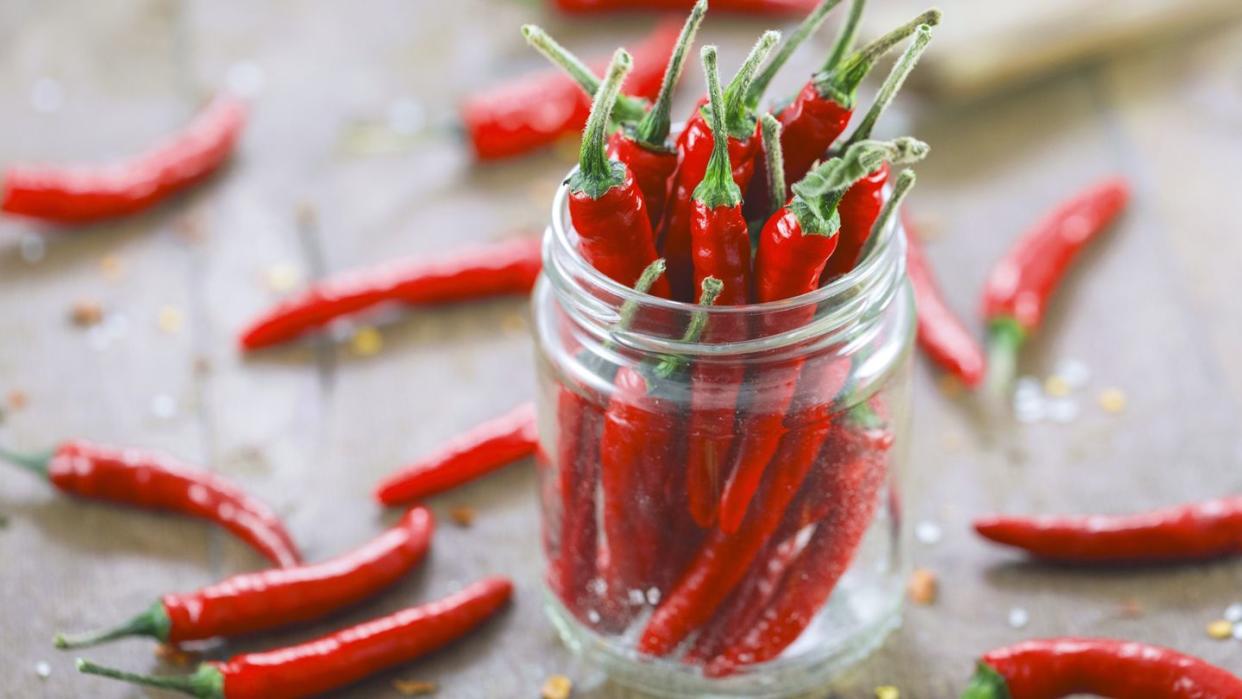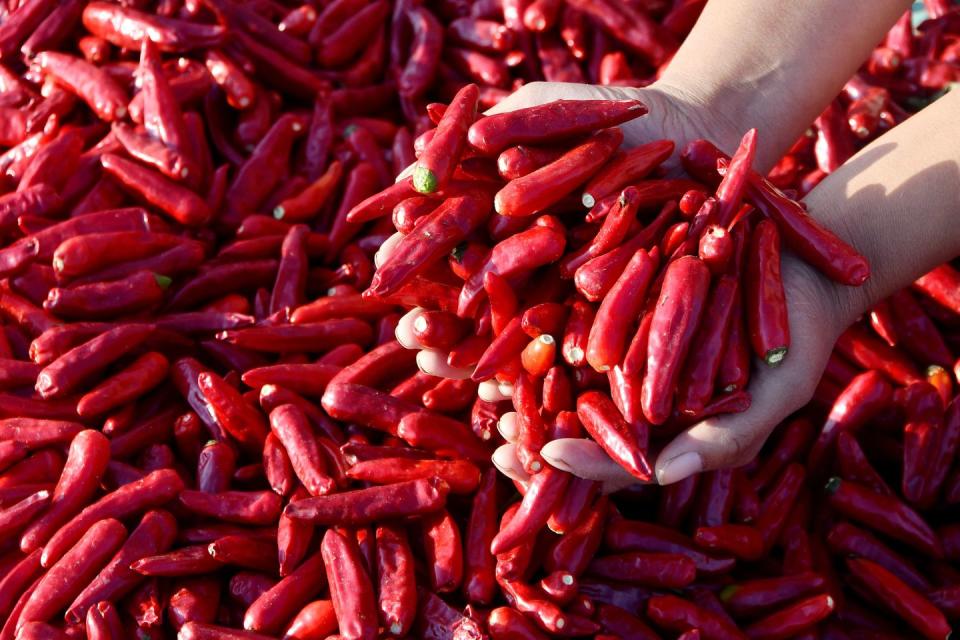The Real Reason You're Obsessed With Spicy Food

"Hearst Magazines and Yahoo may earn commission or revenue on some items through these links."
Take a bite of a chili pepper and you’ll feel the consequences. You’ll salivate, snot will drip out of your nose, and tears will fill your eyes. You might start coughing or sneezing, and your mouth will feel like it’s on fire. You might even stop breathing.
These reactions are called trigeminal reflexes, and they’re caused by ingesting capsaicin, the compound found in chili peppers, according to Dr. Federica Genovese, Research Associate at Monell Chemical Senses Center. Capsaicin gives peppers heat and is measured using Scoville heat units (SHUs), a scale ranging from bell peppers at 0 SHUs to the new hottest pepper in the world, Pepper X, at 2.693 million. Jalapeños fall between 3,000 and 8,000, while the Carolina Reaper comes in at 1.64 million.
“Capsaicin is not toxic; it’s just the reaction that your body is putting out to defend you from something that is potentially toxic,” Dr. Genovese said.
We all know the burn from capsaicin, but the longterm side effects could be more grim. The United Workers’ Union alleged that factory workers employed in an Australian facility that makes Flamin’ Hot Doritos have experienced health issues ranging from coughing to difficulty breathing, resulting from ingesting the seasoning used to make the spicy chips. In September, a 14-year-old teenager died after partaking in the now-defunct Paqui One Chip Challenge. While biopsy results aren’t available yet, Paqui pulled these products from shelves following the death.
And despite all the pain spicy food causes, we can’t get enough. We drench our food, both sweet and savory, in the hottest sauces, chili crisps, and seasonings and watch celebrities writhe in pain on Hot Ones. From chicken wings to chili peppers, spicy food competitions take place around the world and are often broadcasted across social media.
On TikTok, people have gone viral for ASMR-style videos where they eat chili-packed foods. One of these spice influencers is Cameron Walker, also known as the Spice King. When he was about four years old, he discovered his love of spicy food when he was given a jalapeño. His family thought he would spit it out, but he actually loved it. Now, he can’t eat anything without adding spice. Milkshakes? He adds hot honey. Cereal? He sprinkles in strawberry-flavored scotch bonnet pepper chili powder. He likens peppers and hot sauces to wines that can be paired with any food.

Why We Like The Burn
Many researchers agree that it’s actually the pain that keeps us coming back for more spice. Dr. Paul Rozin, professor at the University of Pennsylvania, calls this seeking of negative experiences that aren’t actually dangerous “benign masochism,” and has equated the thrill of eating spicy food to that of a roller coaster. Pain also releases endorphins, which Dr. Rozin writes could make these foods pleasurable over multiple exposures.
There’s also social approval, another factor that could influence our preference for spicy food over time. This could also explain the growing popularity of spicy-food challenges on social media.
Elisa Trucco, associate professor of psychology at Florida International University, told the AP that spicy products marketed for challenges are glamorized on social media, where you see the likes and comments, but not the negative consequences.
And these negative consequences come down to your individual tolerance.
Building A Tolerance For Spice
Walker, the Spice King, has amassed 21 million followers on TikTok and even has his own hot sauce. For him, food is all about the flavor, and without added spice, food tastes bland.
Over time, as you eat small doses of spicy food, your body begins to understand that the stimuli isn’t dangerous and will reduce the number of receptors, making you less sensitive. Genovese said that you’ll then need more of the ingredient to activate the sensory neuron and make you feel the response.
If restaurants don’t have hot sauce or peppers, Walker will take his food to go and add extra spice at home. “Me being Spice King isn't just a gimmick or isn't just like this character that I play,” he said. “I actually cannot eat without some form of spice.”
“Just how sugar is addicting, spicy food can be addictive,” he added. But this isn’t the same addiction as alcohol or drugs. Whether spicy food can become literally addictive is more of a philosophical question about what addiction means, according to Genevese. She said that it’s not really an addiction, but a preference. “I think people can develop a strong preference for having spicy food and a spicy quality within their flavors and find anything else that doesn’t have it more bland and less pleasurable." She added that the only way to reverse this is to stop consuming spicy foods.
But building this tolerance won’t happen overnight, and it’s not unlike training for any other competition. Walker, now an adult, has spent years building up his tolerance since that first bite of a jalapeño at just four years old.
“It just takes a lot of practice,” Walker said. “It's one of those things you have to really start off slow. You can't really just jump into it or else you could hurt yourself.”
You Might Also Like

